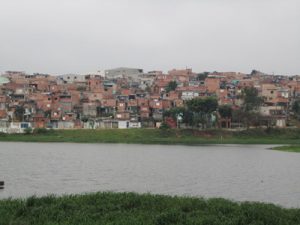
The big city of Sao Paulo
The first chapter of my trip has just wrapped up. I spent a week in Sao Paulo and now the other students and I are headed to Curitiba! I am just as excited for the next part as I was for the initial start of my adventure. In just one week I have done so much and learnt so much about the culture of this entirely new country. It has not always been easy adapting to my new surroundings and quickly becoming close to people who were strangers just one week ago.
Here in Sao Paulo we focused mostly on water security and the right to the city. With 22 million people living in the metropolitan area of Sao Paulo, it is a struggle for many people to have their basic human rights met. We visited many different locations but the one that stands out to me the most is our visit to the favelas (slums). One of the main water quality issues that exist is a result of illegal communities that have been built by migrants searching for economic opportunity. During our visit, we were able to see the process the municipality has begun to “regularize” the developments. In other words, provide services like sewage, electricity,and asphalt to these communities in order to protect the surrounding water sources from direct urban runoff. There has been resistance for years since some people believe these communities should be moved in order to restore the reservoirs completely but other people fight for these people’s right to the city they live in. This is where the issue of sustainability and human rights don’t necessarily complement one another.
It was eye opening walking through the favelas and witnessing firsthand how difficult the living conditions are there. Sao Paulo was a city of extremes: extreme wealth and extreme poverty. I never imagined the inequalities that could exist within one city but it was also inspiring to be able to meet with organizations that are working to bridge the gap and make their community a better place.


